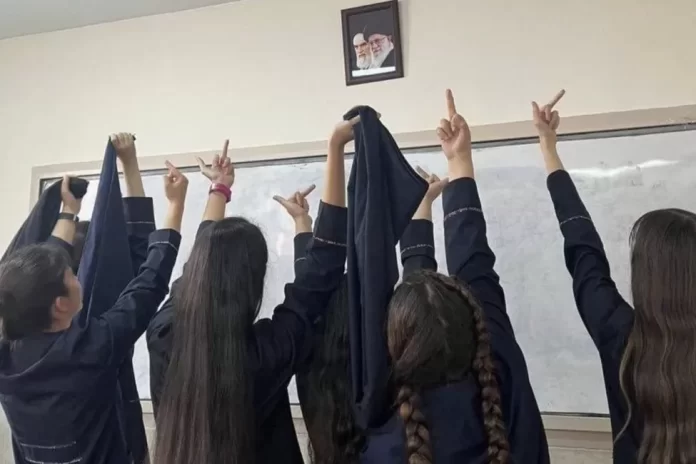Schoolgirls in Iran have been waving their headscarves in the air and chanting against clerical authorities, in an unprecedented show of support for the protests engulfing the country.
Videos verified by the BBC showed demonstrations inside schoolyards and on the streets of several cities.
They echoed the wider unrest sparked by the death last month of a woman who was detained for breaking the hijab law.
In Karaj, girls reportedly forced an education official out of their school.
Footage posted on social media on Monday showed them shouting “shame on you” and throwing what appear to be empty water bottles at the man until he retreats through a gate.
Further protests by schoolgirls were reported on Tuesday in Karaj, Tehran and the north-western cities of Saqez and Sanandaj.
A number of students were also photographed standing in their classrooms with their heads uncovered. Some were raising their middle fingers – an obscene gesture – at portraits of Ayatollah Khamenei and the founder of the Islamic Republic, Ayatollah Ruhollah Khomeini.
The protests by the schoolgirls began hours after Ayatollah Khamenei, who has final say on all state matters, broke his silence on the unrest and accused the United States and Israel, Iran’s arch-enemies, of orchestrating “riots”.
Iran police battle protesters in Tehran as unrest over woman’s death spirals
Iran protests: Death toll rises to 76 as crackdown intensifies – rights group
He also gave his full backing to the security forces, which have responded to the protests with a violent crackdown.
The unrest was triggered by the death of Mahsa Amini, a 22-year-old Kurdish woman who fell into a coma after being detained by morality police on 13 September in Tehran for allegedly violating the law requiring women to cover their hair with a hijab, or headscarf. She died in hospital three days later.
Her family has alleged that officers beat her head with a baton and banged her head against one of their vehicles. The police have denied that she was mistreated and said she suffered “sudden heart failure”.
The first protests took place in Kurdish-populated north-western Iran, where Ms Amini lived, and then spread rapidly across the country.

